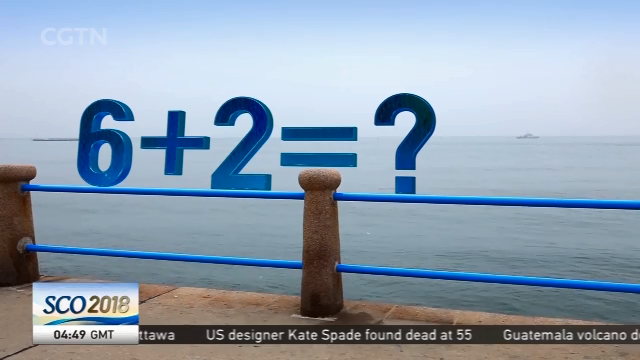
14:14, 06-Jun-2018
SCO Expansion: Pakistan and India bring fresh vigor to SCO
02:02

Now the organization saw its first expansion in 16 years in June 2017, when India and Pakistan joined the group. It was the first time that the SCO admitted new members. With this latest accession, the SCO now covers three-fifths of Eurasia, and nearly half the world's population. Our reporter Zou Yun runs us through the details.
How much is six plus two? You might just blurt out, is eight.
It won't take a mathematician to tell you that's correct. But the Shanghai Cooperation Organization makes use of a different equation, and it's a group that's worth more than just the sum of its parts.
The SCO was founded in 2001 with six full members. After over a decade of engagement and development, the SCO has turned into a regional group of global significance. This has made it an attractive bloc for countries to join.
Pakistan and India are two countries who showed great interest in joining the SCO.
In 2015, the SCO approved procedures for the pair's full membership, and in 2017, their admissions were finally formalized, marking the first expansion of the SCO since its establishment.
The inclusion of India and Pakistan means the bloc now covers over 20 percent of all land on the planet, 25 percent of global GDP, and nearly half of world's entire population. It is also expected to infuse fresh vigor into the group's future development.
Experts say the impact of six founders plus two new members goes beyond a simple change in the number of countries. It greatly helps in boosting the SCO's influence and appeal in safeguarding regional stability, propelling economic integration, and optimizing the world order. Or in other words, the possibilities and opportunities generated by SCO expansion is more than six plus two would suggest.
Of course, there are concerns that expansion may hinder the SCO's ability to act decisively. This is a problem for any multilateral grouping that's looking to grow but retain its influence. The SCO must stand the test of time and change to develop into a comprehensive regional organization.

SITEMAP
Copyright © 2018 CGTN. Beijing ICP prepared NO.16065310-3
Copyright © 2018 CGTN. Beijing ICP prepared NO.16065310-3